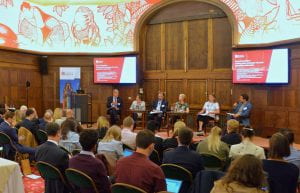As I’m about to retire from the University after more than 40 years, I’ve been reflecting on what has and hasn’t changed in that time, what we’ve achieved and where we might be headed.
It’s fair to say that, in some ways, everything has changed. In others, very little. Of course, digitalisation has become ubiquitous and influences almost everything we do – and, in particular, how we do it (bear in mind that 40 years ago we had no email, PCs, mobile phones or internet!).
The availability of data, facts and knowledge was vastly different and so, by implication, the academic role of universities in the generation, curation and dissemination of knowledge, has transformed. Then, as now, we faced turbulence in public policy, with universities in the firing line. We also had a Nobel Laureate as Chancellor!
For all that, the University remains a remarkable community in which to meet and engage with a fantastic array of interesting people with a fascinating mix of talents, highly motivated by their work and profoundly committed to excellence – and all the more so because it is more open to its environment than before. It was then, and remains, a privilege and pleasure to be among those people – particularly our students, with their restless appetite for a better world. For change and growth.
The policy environment in which universities work has evolved dramatically as has the society around us. On the downside, the pressures to commodify education pose a threat to the value and values of universities. Despite these pressures, we can still be confident that that Bristol’s central mission is still “to pursue and share knowledge and understanding, both for their own sake and to help individuals and society fulfil their potential.”
The expectations of our own student and staff community are for the University to be an agent of public good – as we should always be – although some of the specifics have shifted; for example, to address climate change.
Our staff also have high expectations, again rightly, of us as an employer and that we sustain the best elements of our culture. Some aspects of University life and culture have certainly changed for the better over these years – Bristol is now more professional, and a less ‘clubby’ and complacent university. We are also on a long overdue journey to increased diversity and inclusion and a coming to terms with our history that, although started, is far from finished. Thankfully, we have managed to sustain the collegial aspects of our culture and we have developed ways of enhancing the dialogue between disciplines in both education and research while respecting the deep capabilities of those disciplines.
Elsewhere, our physical estate has grown, been replenished, developed and improved; in some parts out of all recognition – and from a very low ebb 30 years ago (when in Chemistry we were used to catching the drips from the leaking roof in buckets around the foyer!).
Personally, I welcome the increased expectation that universities should expand beyond the “ivory tower” focus on teaching and research and play a direct role in enabling wider society to thrive. Indeed, I see this as integral to our mission.
For us in Bristol, that has meant, for example, launching the National Composites Centre (and the Science Park with it), creating Bristol Health Partners with our allies in the NHS and city, being at the heart of cultural development, entrepreneurial and Green Capital endeavours and the wider civic life that is now manifest in the Bristol One City approach. All this has happened (mainly in the past decade) alongside an outstanding performance in the last REF (driven by our research) and rightly increased emphasis on education and the student experience. This is a remarkable collective performance and one that I’ve been proud to be party to.
Where next? As I write we face a literally incredible set of circumstances – a global pandemic still growing, profound and systemic inequalities (both global and local), climate and ecological emergencies that will be with us for many decades, the UK in the midst of the biggest geopolitical shift in generations triggered by leaving the EU, with a fragile economy and society only partly recovered from the banking crash and that now risk being tipped over by the twin threats of COVID and Brexit.
Despite these daunting challenges I feel we, as a University, are in a vital and powerful place – both as an institution and to act for and with the communities we serve, locally and globally. We do this best by staying true to our core mission as a research intensive university of global reach and continuing to evolve and draw strength from our place and, in turn, to sustain it and its enduring values – building on Bristol’s complex thousand year history of enterprise, exploration and non-conformity to address the critical challenges that face us (and those to come) by producing the ideas, innovations and people the world needs.

